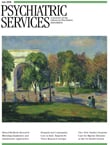Heterogeneity in the Assessment of the At-Risk Mental State for Psychosis
To the Editor: Over the past decade interest has increased in the potential benefit of early intervention in schizophrenia, including the initiation of treatment before the first episode. This interest parallels the growing focus on prevention in other areas of medicine. However, the literature shows that samples of persons with prodromal symptoms of psychosis present a wide range of risk of developing a psychotic disorder, depending on the criteria used to define an at-risk state for psychosis (that is, clinical versus genetic). Furthermore, within the same sample, prodromal symptoms may vary greatly. Individuals who present with negative psychotic symptoms, such as social isolation, decreased expression of emotions, decreased experience of self, and schizotypal traits, are more likely than individuals without these symptoms to be excluded from current studies of high-risk populations.
Multisite studies are urgently needed to provide sufficient statistical power to reach reliable results. However, such studies are difficult to conduct because they entail standardization of well-defined diagnostic criteria across different sites. The field of psychopathological assessment instruments is currently dominated by two main approaches. One derives from the traditional approach of using the Positive and Negative Syndrome Scale and focusing on attenuated positive symptoms. This approach includes the Comprehensive Assessment of At-Risk Mental States (CAARMS) (
1 ), the Structured Interview for Prodromal Syndromes (
2 ), and the Basel Screening Instrument for Psychosis (
3 ). Conversely, the basic-symptoms approach is based on a detailed phenomenological way of describing disturbances before onset of psychosis. This approach includes the Bonn Scale for the Assessment of Basic Symptoms (
4 ) and the Schizophrenia Prediction Instrument-Adult Version (SPI-A) (
5 ). Some authors presume that the basic-symptoms approach characterizes the early prodromal phase whereas the focus on attenuated positive symptoms characterizes the late prodromal phase.
Outreach and Support in South London (OASIS), a community mental health team for people with an at-risk mental state, has just introduced an experimental version of the CAARMS, with the aim of clinically integrating these two approaches. According to the traditional CAARMS, an individual can meet inclusion criteria for a prodromal state of psychosis in one of three ways: a recent decline in function, coupled with either schizotypal personality disorder or a first-degree relative with psychosis; attenuated positive symptoms; or a brief psychotic episode of less than one week's duration that resolves without antipsychotic medication. The new version of CAARMS includes a fourth "cognitive at-risk group," which is grounded in the SPI-A questionnaire. The aim of including this group is to increase the sensitivity of CAARMS to the subtle neurocognitive disturbances evident during the prepsychotic phases: inability to divide attention, thought interferences, thought pressure, thought blockages, disturbance of receptive speech, disturbance of expressive speech, disturbances in abstract thinking, unstable ideas of reference, and captivation of attention by details of the visual field.
Although this is only a pilot study, preliminary results and clinical audits have confirmed that it is possible to combine the two approaches in a clinical setting such as the OASIS service. An international consensus conference is urgently needed to ensure the introduction of a standardized taxonomy for the at-risk phases of psychosis in order to sustain ongoing research on prepsychotic phases, inform clinical services, and help overcome methodological heterogeneity across studies.

